When your breastfed baby becomes fussy while nursing, one of the first things your friends and family will probably suggest is to cut all dairy out of your diet. But does eating dairy while breastfeeding upset your baby's stomach and do you really have to cut it out of your diet?
There is a long-held belief that infant gas and fussiness is most often caused by a milk allergy. But according to What To Expect, only an estimated two to three percent of babies actually have a milk allergy, and milk intolerance in an infant is even more rare. Kelly Mom additionally noted that many babies exhibit fussiness, and it is often not related to the food the mom eats. If your baby has a true food sensitivity, the fussiness will most likely come with other symptoms such as a rash, hives, eczema, a sore bottom, dry skin, excessive spitting up or vomiting, colic, diarrhea, red, itchy eyes, ear infections or persistent nasal or chest congestion. Although infant food allergies are not as common as parents have been led to believe, Kelly Mom noted that the majority of food sensitivities that have been diagnosed in infants are related to products made from cow's milk.
Cow's milk products are currently the only foods that research has conclusively linked to fussiness and gassiness in babies. However, other foods that are related to baby fussiness are soy, wheat, corn, eggs, and peanuts, as well as any foods that the parents are allergic to.
If you believe that your baby has a milk allergy or intolerance, What To Expect suggested visiting your baby's pediatrician for a physical exam, an examination of your baby’s stool, and possibly even a skin-prick allergy test. If no allergy is discovered, you may still be asked to eliminate dairy from your diet for about a week, and slowly reintroduce to see if your baby has a reaction.
According to U.S. News & World Report, one-third of infants with a milk allergy will outgrow it within 30 months. More than 85 percent of children eventually outgrow their milk allergy, some as early as grade school, and others into their teens and 20s. If you decide on your own to eliminate dairy from your diet, it is important that you discuss this with your pediatrician to make sure you are still getting enough calcium and nutrients in your diet to support healthy breastfeeding.
